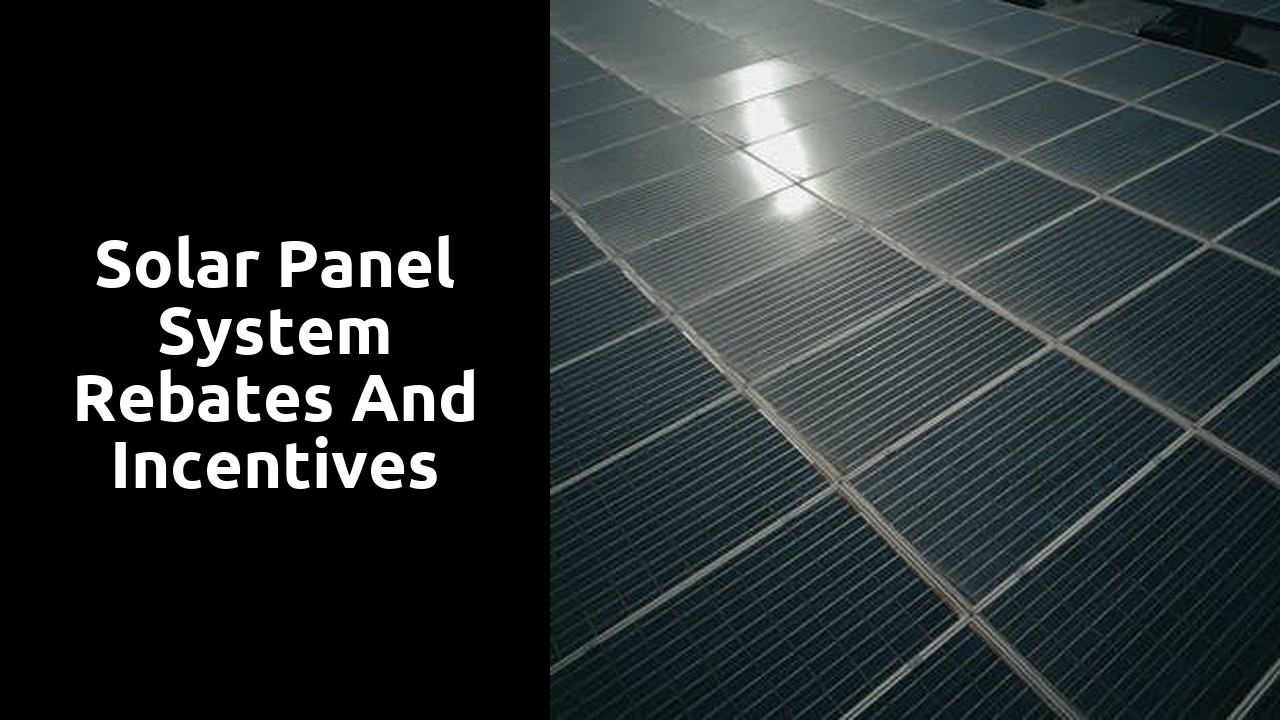
Processing Time for Rebate Approval
Applying for solar rebates in Queensland involves a specific processing timeline. Typically, the approval process for rebates related to solar panel systems occurs within a reasonable timeframe. The Queensland government is committed to incentivising the uptake of sustainable energy solutions, and therefore strives to efficiently process rebate applications. As a result, applicants can expect a relatively prompt response regarding the approval status of their solar rebate application. The government's focus on renewable energy initiatives is reflected in the smooth processing of Solar Panel System Rebates and Incentives.
Understanding the processing time for rebate approval is crucial for individuals considering solar installations in Queensland. By being aware of the timeframe required for assessing rebate applications, individuals can effectively plan for the installation of solar panel systems. Prompt approval of rebates plays a significant role in encouraging more households to embrace renewable energy sources. Consequently, applicants can rest assured that their efforts in utilising sustainable energy solutions are duly recognised through efficient processing of Solar Panel System Rebates and Incentives.
Timeline for Application Review
Solar panel system rebates and incentives can significantly impact the approval process timeline for applications in Queensland. The review period varies depending on the completeness of the submission and the volume of requests received. Typically, applications are processed in the order they are received, with more comprehensive applications often being expedited for approval.
For applicants eagerly awaiting feedback on their submissions for solar panel system rebates and incentives, it is essential to ensure all required documentation is provided upfront to avoid delays in the review process. Queensland's governing bodies work diligently to review applications promptly, but incomplete submissions can extend the timeline. By meticulously following the guidelines and submitting all necessary information, applicants can help expedite the approval process and start reaping the benefits of solar rebates sooner.
Impact of Solar Rebate on Electricity Bills
The implementation of Solar Panel System Rebates and Incentives in Queensland has facilitated significant reductions in electricity bills for households that have opted for solar installations. By offering financial incentives to encourage sustainable energy practices, the government has successfully encouraged more residents to switch to solar energy, leading to a decrease in reliance on traditional electricity grids. As a result, many households have reported noticeable savings on their monthly electricity bills, contributing to a more sustainable and cost-effective energy consumption model in the region.
Furthermore, in addition to the direct savings on electricity bills, the Solar Panel System Rebates and Incentives have also encouraged homeowners to explore ways to further reduce their energy consumption and carbon footprint. This has led to a greater awareness of energy-efficient practices and technologies among residents, ultimately creating a more environmentally conscious and sustainable community in Queensland. Thus, the impact of these solar rebates extends beyond financial savings, fostering a culture of sustainability and responsibility towards the environment.
Reduction in Monthly Expenses
Installing a solar panel system can lead to a significant reduction in monthly expenses for Queensland residents. By taking advantage of the available rebates and incentives, homeowners can lower their electricity bills and enjoy long-term cost savings. The government's support through the Solar Panel System Rebates and Incentives scheme provides financial relief to households making the switch to solar energy.
The reduction in monthly expenses is a direct result of harnessing solar power to generate electricity for daily use. With lower reliance on traditional grid electricity, homeowners can see a noticeable decrease in their energy costs over time. Moreover, the financial benefits extend beyond just the immediate savings on utility bills, as investing in solar energy also contributes to a more sustainable and environmentally friendly way of living.
Additional Incentives for Solar Installation
There are various additional incentives available in Queensland for installing a solar panel system. These incentives go beyond the initial rebate and can provide ongoing benefits to homeowners who choose to go solar. Solar panel system rebates and incentives make the switch to solar even more attractive for residents looking to reduce their electricity bills and decrease their carbon footprint.
One of the additional incentives for installing a solar panel system in QLD is the opportunity to earn credits for any excess energy generated by your system. This means that if your solar panels produce more electricity than you use, you can sell the surplus back to the grid and receive credit on your electricity bill. This incentive not only helps to offset the cost of installing solar panels but also encourages homeowners to generate more clean energy for the community.
Bonus Programs and Rewards
In addition to the standard rebate offered for installing a solar panel system in Queensland, there are various bonus programs and rewards that homeowners may be eligible for. These additional incentives are designed to further encourage the uptake of solar energy and promote sustainable practices in households across the state. By taking advantage of these bonus programs and rewards, Queensland residents can enjoy greater savings on their electricity bills while contributing to a cleaner environment.
Some of the bonus programs and rewards available to those who install a solar panel system in Queensland include feed-in tariffs, which allow homeowners to earn credits for excess energy generated by their solar panels and exported back to the grid. Additionally, there are special rebates for purchasing energy-efficient appliances and systems to complement the solar panel installation. By combining these various incentives, homeowners can maximise their savings and reap the benefits of going solar. Solar Panel System Rebates and Incentives are a key factor in making solar energy a viable and attractive option for households in Queensland.
FAQS
Is there a rebate available for installing solar panels in Queensland?
Yes, there is a rebate known as the Solar Panel Rebate offered by the Queensland Government.
What is the processing time for rebate approval?
The processing time for rebate approval varies but typically takes a few weeks to a couple of months.
What is the timeline for application review?
The timeline for application review also varies but applicants can expect to hear back within a few weeks after submitting their application.
How does the solar rebate impact electricity bills?
The solar rebate can significantly reduce electricity bills as it allows homeowners to generate their own clean energy and rely less on the grid.
Will the solar rebate result in a reduction in monthly expenses?
Yes, the solar rebate can lead to a reduction in monthly expenses by lowering the overall cost of electricity consumption.
Are there any additional incentives for installing solar panels?
In addition to the rebate, there are other incentives such as bonus programs and rewards provided by some solar panel installers and energy retailers.
What are some examples of bonus programs and rewards for solar installation?
Some examples include cashback offers, feed-in tariffs, and discounts on solar panel systems offered by various providers in Queensland."""
